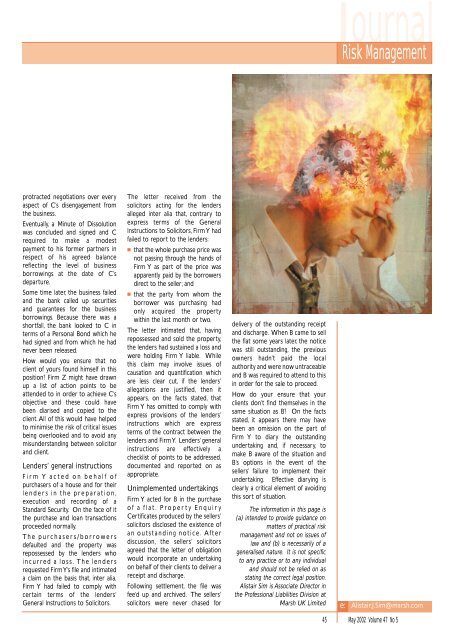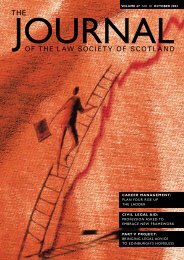OF THE LAW SOCIETY OF SCOTLAND - The Journal Online
OF THE LAW SOCIETY OF SCOTLAND - The Journal Online
OF THE LAW SOCIETY OF SCOTLAND - The Journal Online
You also want an ePaper? Increase the reach of your titles
YUMPU automatically turns print PDFs into web optimized ePapers that Google loves.
protracted negotiations over every<br />
aspect of C’s disengagement from<br />
the business.<br />
Eventually, a Minute of Dissolution<br />
was concluded and signed and C<br />
required to make a modest<br />
payment to his former partners in<br />
respect of his agreed balance<br />
reflecting the level of business<br />
borrowings at the date of C’s<br />
departure.<br />
Some time later, the business failed<br />
and the bank called up securities<br />
and guarantees for the business<br />
borrowings. Because there was a<br />
shortfall, the bank looked to C in<br />
terms of a Personal Bond which he<br />
had signed and from which he had<br />
never been released.<br />
How would you ensure that no<br />
client of yours found himself in this<br />
position? Firm Z might have drawn<br />
up a list of action points to be<br />
attended to in order to achieve C’s<br />
objective and these could have<br />
been diarised and copied to the<br />
client. All of this would have helped<br />
to minimise the risk of critical issues<br />
being overlooked and to avoid any<br />
misunderstanding between solicitor<br />
and client.<br />
Lenders’ general instructions<br />
Firm Y acted on behalf of<br />
purchasers of a house and for their<br />
lenders in the preparation,<br />
execution and recording of a<br />
Standard Security. On the face of it<br />
the purchase and loan transactions<br />
proceeded normally.<br />
<strong>The</strong> purchasers/borrowers<br />
defaulted and the property was<br />
repossessed by the lenders who<br />
incurred a loss. <strong>The</strong> lenders<br />
requested Firm Y’s file and intimated<br />
a claim on the basis that, inter alia,<br />
Firm Y had failed to comply with<br />
certain terms of the lenders’<br />
General Instructions to Solicitors.<br />
<strong>The</strong> letter received from the<br />
solicitors acting for the lenders<br />
alleged inter alia that, contrary to<br />
express terms of the General<br />
Instructions to Solicitors, Firm Y had<br />
failed to report to the lenders:<br />
■ that the whole purchase price was<br />
not passing through the hands of<br />
Firm Y as part of the price was<br />
apparently paid by the borrowers<br />
direct to the seller; and<br />
■ that the party from whom the<br />
borrower was purchasing had<br />
only acquired the property<br />
within the last month or two.<br />
<strong>The</strong> letter intimated that, having<br />
repossessed and sold the property,<br />
the lenders had sustained a loss and<br />
were holding Firm Y liable. While<br />
this claim may involve issues of<br />
causation and quantification which<br />
are less clear cut, if the lenders’<br />
allegations are justified, then it<br />
appears, on the facts stated, that<br />
Firm Y has omitted to comply with<br />
express provisions of the lenders’<br />
instructions which are express<br />
terms of the contract between the<br />
lenders and Firm Y. Lenders’ general<br />
instructions are effectively a<br />
checklist of points to be addressed,<br />
documented and reported on as<br />
appropriate.<br />
Unimplemented undertakings<br />
Firm Y acted for B in the purchase<br />
of a flat. Property Enquiry<br />
Certificates produced by the sellers’<br />
solicitors disclosed the existence of<br />
an outstanding notice. After<br />
discussion, the sellers’ solicitors<br />
agreed that the letter of obligation<br />
would incorporate an undertaking<br />
on behalf of their clients to deliver a<br />
receipt and discharge.<br />
Following settlement, the file was<br />
fee’d up and archived. <strong>The</strong> sellers’<br />
solicitors were never chased for<br />
delivery of the outstanding receipt<br />
and discharge. When B came to sell<br />
the flat some years later, the notice<br />
was still outstanding, the previous<br />
owners hadn’t paid the local<br />
authority and were now untraceable<br />
and B was required to attend to this<br />
in order for the sale to proceed.<br />
How do your ensure that your<br />
clients don’t find themselves in the<br />
same situation as B? On the facts<br />
stated, it appears there may have<br />
been an omission on the part of<br />
Firm Y to diary the outstanding<br />
undertaking and, if necessary, to<br />
make B aware of the situation and<br />
B’s options in the event of the<br />
sellers’ failure to implement their<br />
undertaking. Effective diarying is<br />
clearly a critical element of avoiding<br />
this sort of situation.<br />
<strong>Journal</strong><br />
Risk Management<br />
<strong>The</strong> information in this page is<br />
(a) intended to provide guidance on<br />
matters of practical risk<br />
management and not on issues of<br />
law and (b) is necessarily of a<br />
generalised nature. It is not specific<br />
to any practice or to any individual<br />
and should not be relied on as<br />
stating the correct legal position.<br />
Alistair Sim is Associate Director in<br />
the Professional Liabilities Division at<br />
Marsh UK Limited Alistair.J.Sim@marsh.com<br />
e:<br />
45 May 2002 Volume 47 No 5










